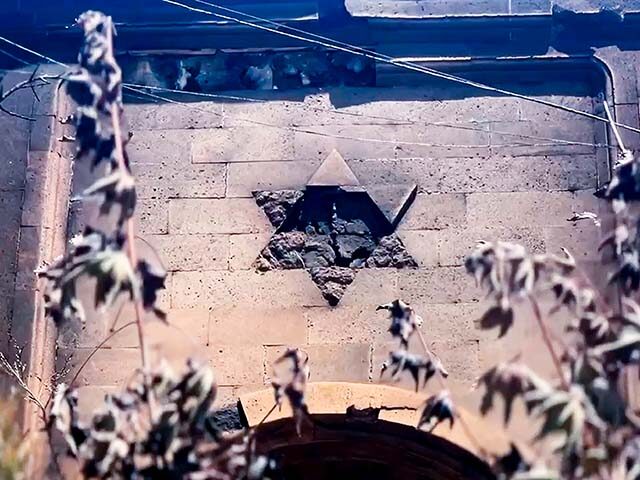Sergei Melikov, the governor of Dagestan, said on Monday that Islamic “sleeper cells” under foreign direction carried out the bloody attacks on churches and synagogues that killed at least 21 people on Sunday.
The Islamic State congratulated the attackers but did not take direct responsibility for the slaughter.
Russian police said they killed five gunmen in an “anti-terrorist operation” to end the killings in the cities of Makhachkala and Derbent on Sunday. Before they were brought down, the terrorists attacked two Orthodox churches, two synagogues, and a police checkpoint.
A 66-year-old Russian Orthodox priest, Rev. Nikolai Kotelnikov, was among the murder victims. Sunday was the Pentecost or Trinity Sunday holiday on the Orthodox calendar.
The official death toll from the attack rose to 21 on Tuesday after a police officer succumbed to his wounds in the hospital. Sixteen of the dead were police officers, according to Dagestan officials. Another 46 people were injured, including 13 police officers.
Russian officials have revealed few details about the attackers, probably because the regime of strongman Vladimir Putin is still calculating the best political use of the crime. Although Dagestan has a history of Islamist extremism, and ISIS perpetrated a horrific massacre at a concert hall in Moscow three months ago, Russian officials quickly suggested Ukraine, the United States, and NATO could be the true masterminds behind the Dagestan attack.
Putin also tried to blame the March massacre on shadowy Western puppet masters, even though ISIS took credit for the attack. On Monday, an ISIS-affiliated Russian-language outfit called Al Azaim Media applauded the Dagestan massacre and claimed ISIS inspired it, but stopped short of claiming direct responsibility or identifying the killers as Islamic State operatives.
“Our recent call did not keep us waiting long,” Al Azaim Media wrote, implying the attackers responded to calls for violence from Islamic State leadership.
“Our brothers from the Caucasus let us know that they are still strong. They showed what they are capable of,” the statement said.
The Institute for the Study of War (ISW) in Washington, D.C. said on Monday that Wilayat Kavkaz, the Islamic State branch in the Northern Caucasus, was the likely perpetrator of the “complex and coordinated attack.”
ISW pointed to social media video that appeared to show Russian police capturing two suspects in the attack alive on a public beach and a post on Telegram from a source close to Russian security services that identified two of the attackers in Makhachkala as the sons of a Dagestani official named Magomed Omarov.
Police raided Omarov’s house on Sunday night, detained him for questioning, and local officials sacked him from his position as a district official. He was also expelled from the Putin-supporting United Russia political party, which scrubbed his profile from its website.
ISW noted that the Islamic State has grown fond of claiming “authorship” for major attacks without claiming direct responsibility or describing the attackers as its soldiers. This posture would be consistent with Wilayat Kavkaz’s self-image as an affiliate of ISIS that has its own leadership, identity, and territory in the North Caucasus region.
“Some Russian officials are already baselessly claiming that Ukraine and NATO are involved in the June 23 attack, emphasizing that Russia’s current counterterrorism approach is likely to remain tied up in rhetorical posturing against Ukraine and the West as opposed to identifying and neutralizing IS threats within Russia itself,” ISW observed.
Such was the case with Dagestan Gov. Sergei Melikov, a lieutenant general in the armed forces of the Russian Interior Ministry who Putin hand-picked to be his envoy to the North Caucasus in 2016 and appointed to govern Dagestan in 2020 after its previous governor, Vladimir Vasilyev, resigned for unclear reasons.
In a video address posted to Telegram on Monday, Melikov described the attacks as “a day of tragedy for Dagestan and the whole country” – and strongly implied Ukraine and its Western allies were responsible.
“We understand who is behind the organization of these terrorist attacks. We understand what the organizers were trying to achieve. They had been preparing, including from abroad,” he said.
While he offered no further details, Melikov said the attack showed “the war has come to our homes,” presumably a reference to the war in Ukraine.
Melikov also railed against Omarov when announcing his sacking and expulsion from United Russia, suggesting that at the very least, he was a terrible father and lousy public official for not realizing that his sons had become terrorist “killers.”
Dagestani State Duma Deputy Abdulkhakim Gadzhiyev on Sunday explicitly accused Ukraine and NATO countries of being “behind the attacks” in a bid to “destabilize our country from within” and reverse Russia’s gains on the battlefield.
“There is no doubt that these terrorist attacks are in one way or another connected with the intelligence services of Ukraine and NATO countries,” Gadzhiyev wrote in his own Telegram post.

COMMENTS
Please let us know if you're having issues with commenting.